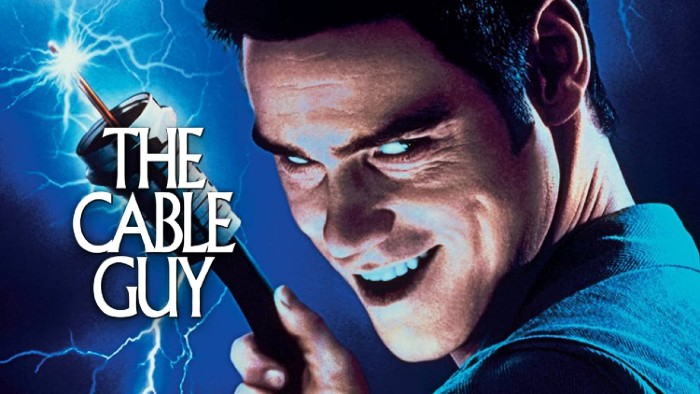The Dark Genius of ‘The Cable Guy’
Dress Like That
‘The Cable Guy’ is mostly forgotten today, but has it been overlooked? Photo courtesy of Dress Like That
March 1, 2021
In 1996, Jim Carrey was on top of the world. He had just starred in Batman Forever and Ace Ventura: When Nature Calls : two of the most successful films of his career. He could have picked any project to star in, but chose an off-kilter thriller directed by an indie comedian and ghostwritten by a screenwriter best known for several underperforming sitcoms. While the resulting film was a financial success, it fell short when compared to Carrey’s previous projects. It was critically panned, and was mostly forgotten in the following years. It has, however, received a small cult following in recent years, although to mainstream media, it remains a dimly perceived Jim Carrey vehicle that wasn’t very funny.
And they would be right on both accounts. The Cable Guy is barely a comedy, and at times, it becomes a full-on thriller or drama. Certain scenes are supposed to be funny, but are instead, incredibly sinister. I’ve never been a huge fan of Carrey, having mostly found him annoying and never really believable. His best performance is Eternal Sunshine of the Spotless Mind, where he plays a sad, broken man, and his other well-done role is The Truman Show, where he plays a sad, broken man, and similarly, he is really good in The Cable Guy, where he plays a sad, slightly funnier, broken man. At times, he cedes control to his wilder side, where it comes off as false, but otherwise, he is solid throughout. Matthew Broderick plays opposite him as the protagonist and he’s consistently great. So why did this movie fail?
Well, let’s start with Ben Stiller, who directed the film, and did multiple rewrites of the script. Stiller’s style of comedy was vastly ahead of its time in 1996, a far cry from the likes of popular comedians at the time like Carrot Top. Stiller himself even has a cameo as Sam and Stan Sweet, two former child star brothers, one a flaky new-age type and the other a dangerous criminal. Sam murdered Stan in events before the movie begins, and as the events of the film transpire, Sam is on trial in a massive, OJ Simpson-esque media bonanza that includes a cheap made-for-TV adaptation featuring Eric Roberts. It’s a dark undercurrent to what seems on the outset like a light-hearted comedy, but only gets darker. Carrey stars as an unhinged and obsessive cable guy who will stop at nothing to become friends with Matthew Broderick’s character, a propulsion that seems almost homoerotic at times. In the film’s climax, he kidnaps Broderick’s girlfriend and takes her to a giant satellite. After falling off of the lookout tower in a fit of suicidal rage, he hits the TV tower and dismantles the connection right as millions of homes are tuning into the final decision of the Sweet trial. In a moment of somewhat corny moralizing, people watching the trial feel suddenly compelled to pick up a book or talk to their families after the signal interruption. One of these citizens is played by Kyle Gass, also known as one half of Jack Black’s band. Tenacious D. Black has a role here too, as Broderick’s friend, Rick. Like Stiller, Black had not yet entered the mainstream, and at this point, his most prominent role had been in the notorious flop, Waterworld. It’s a rare, non-humorous role for Black, and he doesn’t leave much of an impression. It wasn’t until the 2000’s High Fidelity that Black would hit the big league, but his role here was undoubtedly a stepping stone into his ascent into the mainstream.
Carrey’s character in The Cable Guy isn’t far off from Ace Ventura, but his place in the film gives us a look into what his zany characters might be like if transplanted into the real world. The cable guy is never named, going only by nicknames stolen from TV shows. The only biographical information we see is a flashback to his adolescence, wherein we see a young boy staring wide-eyed at the glimmering light of the television, hypnotized and brainwashed. It’s an affecting moment, but Carrey’s performance doesn’t always hold up. Occasionally he lapses into his tired Ace Ventura schtick, coming off as too manic or goofy for the material he’s given. His best moments are those in which he is intense, sinister, and scary. Carrey’s characters in other films may seem funny and zany, but watching The Cable Guy is akin to watching one of these characters come into the real world, where the zaniness and hyperactivity wouldn’t be as endearing.
Visually, The Cable Guy is more interesting than most comedies. The late ‘90s and early 2000s were a rather ugly time for movie visuals. Filmmakers hadn’t quite figured out how to use digital techniques, and so many movies from this era look either too harsh or feature awful CGI. But The Cable Guy actually holds up surprisingly well visually. The color palette is mostly blue, and we get a lot of visual mileage out of the modernist architecture of Broderick’s apartment and workplace. The best looking scene is the memorable Medieval Times sequence, a funny and action-packed moment that capitalizes on the ridiculousness of themed restaurants.
That’s not to say the movie is flawless. The soundtrack is lined with forgettable cuts from unappealing mid-‘90s alt rock groups like Silverchair and Toadies, although a welcome reprieve is found with the inclusion of Primitive Radio Gods’ downbeat hit Standing Outside A Broken Phone Booth with Money In My Hand. Leslie Mann plays Broderick’s girlfriend and she’s rather bland and doesn’t have much of a character. Perhaps her personality could have been strengthened, rather than her being a simple prop in the narrative.
Most people regard The Cable Guy as a financial failure, but it wasn’t. It made back its budget and received a total of $102.83 million worldwide. However, this number wasn’t as strong as expected, and coupled with the film’s critical failure, it was seen as a bomb. It’s a difficult film to place among Carrey’s filmography, so it’s easy to see why it hasn’t found an audience. It’s not an entirely serious role like that from Eternal Sunshine of the Spotless Mind or The Truman Show, nor is it out-and-out goofball like The Mask. It’s a movie made for exactly no one, except for maybe me. I connected with the film’s off-kilter energy and its mix of dark comedy and horror. If it sounds good to you, check it out for free on TBS or DirectTV.



